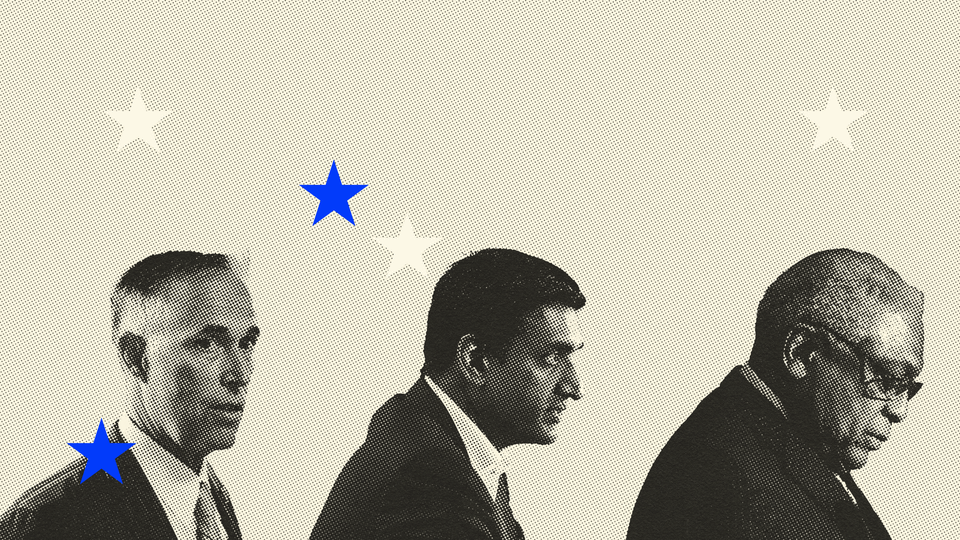The Democrats’ Doubts Are Growing
4 min read
Congressional Democrats aren’t ready to demand that President Joe Biden quit his bid for reelection after a debate performance that was almost universally panned. But for the first time, some of them are taking the possibility seriously.
“The debate was a serious setback,” Senator Peter Welch of Vermont told me by phone yesterday. “It’s up to President Biden and his campaign to demonstrate that they do, in fact, have the energy for another four years.”
Representative Jared Huffman of California, a Democrat serving his sixth House term, told me that Thursday’s matchup between Biden and Donald Trump was “probably the worst debate I’ve ever seen.” When we spoke by phone yesterday, I asked Huffman if Biden should stay in the race. “I don’t know,” he replied. “I think a lot of us are trying to let this sink in and do some processing.”
Both Welch and Huffman were alarmed that the performance of the 81-year-old incumbent—his voice quiet and shaky, his answers often digressive and incomprehensible—only intensified voters’ concerns about his fitness for office. “The question he’s always had to address is the age issue, and that was not mission-accomplished,” Welch said.
Neither Welch nor Huffman are known as Biden critics. And their doubts about his viability as a candidate were echoed by other senior Democrats who are usually stalwart allies of Biden. “The president had a really bad night,” Senator Jeanne Shaheen of New Hampshire told a local radio station. “There will be assessments going forward of what happens next.”
Representative Ro Khanna of California, a frequent Biden surrogate, urged the president and his advisers to make “a clear assessment” on the damage he did to his candidacy and how to fix it. “They need to recognize that they had a bad night and not try to spin that,” Khanna told me yesterday, “and then figure out a way to move forward in a winning campaign.”
Biden showed more pep during a rally in North Carolina yesterday. Using a teleprompter and speaking with a noticeably stronger voice than during the debate, the president sounded more like he did during his State of the Union address in March—a performance that, for a time, allayed Democratic worries about his candidacy. Biden tried to both acknowledge and set aside his lackluster showing at the debate. “I don’t walk as easy as I used to. I don’t speak as smoothly as I used to. I don’t debate as well as I used to,” Biden said, as the crowd cheered. “But I know what I do know: I know how to tell the truth. I know right from wrong. And I know how to do this job.”
“And I know, like millions of Americans know,” Biden continued, “when you get knocked down, you get back up.”
The president received supportive statements from two of his Democratic predecessors in the White House. “Bad debate nights happen. Trust me, I know,” Barack Obama sympathized, alluding to his own debate fiasco in 2012. “I’ll leave the debate rating to the pundits,” Bill Clinton wrote, before praising Biden’s record. And Representative James Clyburn of South Carolina, the long-serving Biden ally credited with reviving the president’s 2020 candidacy, said that he should “stay the course.”
“It was not a good performance,” Clyburn told me by phone. “There’s a tradition of incumbent presidents not having good performances with their first debate, and we continue that tradition.” Clyburn said that Biden needs to find ways to reassure the public, including by immediately holding a series of town-hall-style meetings where he can engage directly with voters.
Although congressional Democrats lambasted Biden’s debate performance, they remained reluctant to join the many pundits and columnists encouraging him to withdraw from the race. A major reason is that it’s not clear whether any other Democrat could do better. Vice President Kamala Harris fares even worse than Biden against Trump in head-to-head polling, and the slew of Democratic governors frequently mentioned as alternatives—Gavin Newsom of California, Gretchen Whitmer of Michigan, J. B. Pritzker of Illinois—are largely unknown outside their home states. “Absent Michelle Obama,” Khanna said, “there’s no one else who really comes to mind who would just be able to step in and within four months have a clear ability to inspire the country.”
I asked Khanna what it might take for him to call on Biden to step aside. Last year, he was one of the first Democrats to urge then-Senator Dianne Feinstein to resign her seat because, he said at the time, it was “obvious she could no longer fulfill her duties.” Khanna brought up the Feinstein example and said that he would hold Biden to a similar standard. Having a bad debate performance, he said, was not the same thing.
But when I asked Khanna whether, based on what he had seen, he believed that Biden would be up to the job for a full second term, he didn’t answer directly: “I think he needs to reassure the American people that he can.”



